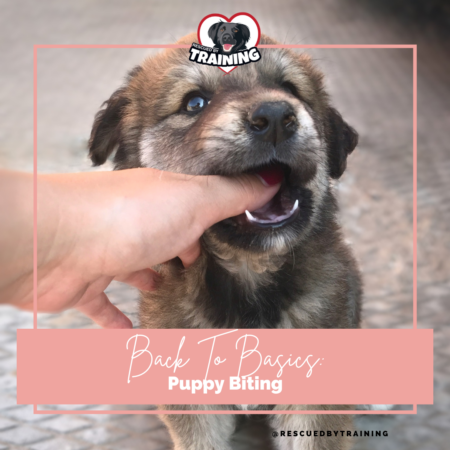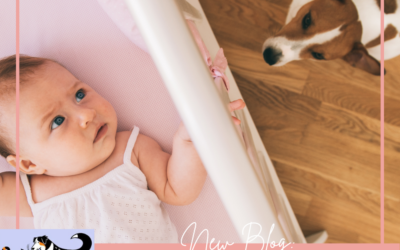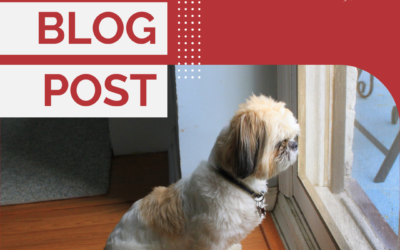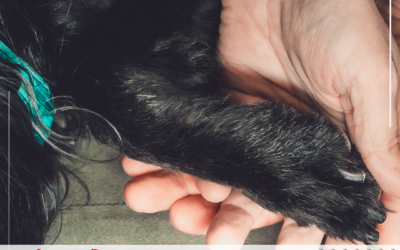This is my next installment in my Back To Basics series. The first post on housetraining can be found here.
Did you know that puppy biting and mouthing is completely normal dog behavior? Puppies explore their worlds with their mouths (and noses) so picking things up in their mouth is like human babies touching things. While it may be annoying (and painful!), it is a normal part of your dog’s development. We cannot, and should not, expect dogs to not do it.
It is important to help teach your puppy how to appropriately use their mouth, especially if they are under 12 weeks of age and are still in their critical socialization window. During this time, puppies learn a variety of really important life skills, including bite inhibition, play, reading body language and learning what is safe and unsafe (socialization to novelty).
Many of these skills are honed during the time a puppy spends with their mom and littermates before being separated but even in the weeks that follow, it’s important your puppy have ample opportunities to continue to practice these skills. It’s one of the main reasons why puppy play groups are so critically important. (And, yes, your puppy can and should socialize with other healthy puppies even if they’re not fully vaccinated – read more here). It’s not just for the fun of play, it’s an opportunity to learn these important life skills with like-aged companions.
When puppies play, not only are they learning body language skills, navigating social dynamics and getting exercise but they’re getting feedback on their play style and how hard they’re biting when they’re playing. If one puppy bites another too hard, the other puppy yelps or cries and the biting puppy gets immediate feedback, so the next time that puppy bites, it learns to bite with less intensity, or to inhibit its bite. This is the important skill trainers call acquired bite inhibition (ABI) and it’s not something we can train into an adult dog. Puppies either learn it or they don’t. And those that have good ABI, when put into a situation later in life where they end up biting for whatever reason, don’t typically inflict a lot of damage whereas dogs with poor ABI often have poor case outcomes that sometimes result in euthanasia or are considered public safety risks. In fact, when I assess a case and review prognosis with clients, the dog’s ABI is the number one most important factor in likelihood for case resolution. Bite inhibition is one of the most important skills dogs learn, because dogs with good ABI have a better likelihood of positive case outcomes than dogs with poor ABI.
So when I recommend that puppies have access to other puppies for puppy play, it’s not just for fun and games, It’s important. It’s also part of why puppies should stay with their littermates and mother for at least 8 weeks and why singleton puppies should try to be paired up with other puppies instead of being left on their own. Rescues and shelters that split up litters instead of allowing them to stay together are doing a huge disservice to those puppies and their ABI skills.
As humans, when we bring puppies home, here’s four things we can do to help a puppy acquire bite inhibition.
- Allow gentle mouthing so the puppy learns the difference between gentle mouthing and hard mouthing.
- Use gentle, non-scary, non-painful timeouts by removing yourself from the puppy after giving a gentle warning cue on the first hard bite. (I use “careful” as my warning cue.” If the puppy continues to bite hard after the warning cue, I quietly get up and remove myself so there is a consequence of “we were playing and having a good time, but you bit too hard and it chased me away and the fun stopped.” Timeouts should never be mean or scary for the dog but they can be an excellent way to implement a consequence to help reduce unwanted behavior.
- Never use anything scary or painful like clamping the puppy’s muzzle shut with our hands or yelling or smacking the dog’s muzzle to stop mouthing. Not only are these not effective methods to reduce mouthing but they could have serious fallout effects of making the puppy afraid of your hands or of you reaching towards them.
- Don’t stop all mouthing. Puppies who have all mouthing punished don’t actually learn to inhibit, because they aren’t given the opportunity to practice controlling soft versus hard biting.
For more details on What To Do (And Not Do) About Puppy Biting, see my detailed post here. The Academy for Dog Trainers also has a wonderful post on ABI with several case studies here that is worth a read.
If you need help, grab your one on one session with me here! And, be sure to sign up for my free weekly newsletter so you don’t miss out on free tips, videos, personal stories, client successes and more!
Happy training!
![]()




